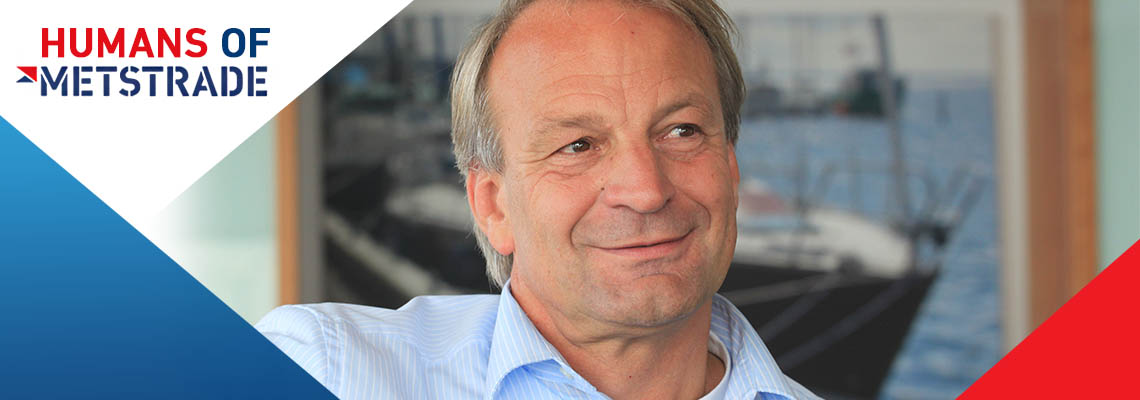We kick off a new series of Humans of METSTRADE, in which we interview people working in the maritime industry. This time it's Torsten Conradi's turn, CEO of Judel / Vrolijk & co and President of the German Boat- and Shipbuilding Association (DBSV).
What attracted you to working in the maritime industry?
I’ve always had a natural relationship to the sea and started sailing from a young age on my home island of Heligoland, 35 miles off the German coast. The island hosted the One Ton Cup twice in the late 1960s and that also fired my imagination as a boy.
I was always making sketches of yachts and their sail plans. Boat design was not considered a real profession in Germany at the time, except for just a few upcoming stars, but my interest was obvious. I went on to study naval architecture and ran experiments in towing tanks, then worked for the university after my studies.
I met Fietje Judel when researching boats, including Olympic classes. He later invited me to join the growing firm he ran with his partner, Rolf Vrolijk. It was an uncomplicated arrangement – we just shook hands and I joined as the third partner. Fietje retired 12 years ago but Rolf and I continue with our exceptional partnership – we sometimes have different opinions but never have hard words between us.
Tell us about your business...
We have 13 staff today spanning naval architecture, structural engineering, exterior and interior design. They usually work from our offices in Bremerhaven. We design a wide range of projects including production yachts for Hanse, Dehler, Contest and Najad, one-off builds and commercial vessels too.
Our business uses a wide range of modern techniques including CFD (Computational Fluid Dynamics) and FEM (Finite Element Method) analysis. We saw some postponements of builds in 2020 due to COVID-related concerns, but Kurzarbeit (Germany’s short term work benefit scheme) enabled us to maintain our staff and work flexibly according to demand.
What interesting trends are you seeing in the maritime industry?
I see a trend towards yachts becoming more like apartments on the water and the pandemic is making that more important. Property prices have grown so much that a boat is a really competitive alternative on the coast, with a better view. This is attracting new people to boating. For us, this trend means a requirement for hull shapes with squarer, wider and parallel forms offering more space, less able to point comfortably in a choppy sea but very nice when reaching in sunny waters.
We also see a move to sportier two-handed yachts that can race and compete. \
There is a growing demand for environmentally friendly yachts and we have already designed a day sailer from German yard Greenboats that is, in line with this trend, constructed using flax natural fibres. Electric propulsion is coming more into equation. Some of the larger steel yachts we design now have fibreglass components to reduce weight – even the owners of 100m superyachts now want their vessels to be as green as possible.
I'm optimistic that we will be kept very busy designing new formats of boats as soon as the economy stabilises.
What is the importance of METSTRADE to your business?
I usually visit METSTRADE every year. This is the most important show for equipment and for business-to-business contacts in the maritime industry – it’s a must-visit event.
How do you plan a typical METSTRADE visit?
I spend two days at the show and have appointments for the people I must meet. I also plan some hours to stroll around, to take a look at equipment and have unplanned chats with people in the aisles. It always gets busy and by the afternoon of the second day I’m normally hurrying through, trying to see more. I wear two hats so I also have meetings as the President of DBSV that take up some of my time.
Which METSTRADE areas and activities do you most look forward to?
I really like the panel discussions that METSTRADE organises. Meetings often get in the way of attending these presentations, but I ask one of my colleagues to visit so that I can find out about the content afterwards.
Read more from Humans of METSTRADE
Jan-Erik Viitala (Axopar)
Suzanne Blaustone (Barton Marine Equipment)
Lexi Ossinger (RxBoat)
Jean-Michel Gaigné (InXs Marinas)
Alexandra Foineau Oakley(Lumishore)
David Barrow (Barrow International)
Lesley Robinson (Britisch Marine)
Gianni de Bonis (TecnoRib)
Toni Salom (Nautipaints)
Marianne Hendriks (Moonen Yachts)













